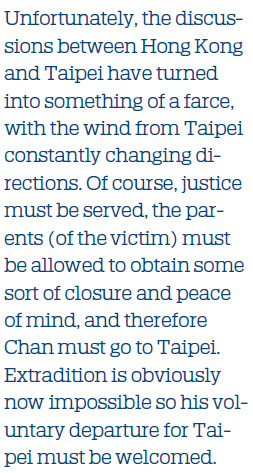The butterfly effect that turned HK upside down
Updated: 2019-10-26 07:00
By Daniel de Blocq van Scheltinga(HK Edition)
|
|||||||||
Clearly the black-shirt protest movement is not as spontaneous and leaderless as some like to suggest; it has been meticulously prepared for many, many months, and the organizers were waiting for the perfect opportunity to strike and unleash their chaos. The work most likely started soon after the illegal "Occupy Central" movement. Training in social media manipulation, graphic design, computer hacking, street fighting, and police tactics must all have been part of the curriculum. Perhaps, as some have suggested, part of the training was provided by the New York-based Oslo Freedom Forum, where Joshua Wong Chi-fung and Denise Ho Wan-see have been regular guests. The site of this NGO-run forum is surprisingly frank about its activities: "The Oslo Freedom Forum provides a space for advocates to learn methods for amplifying dissent, using cutting edge technology to challenge tyrants and drive reform."
During the lengthy protest preparation period, a totally unconnected young Hong Kong man, Chan Tong-kai, went to Taipei with his 20-year-old pregnant girlfriend, and for reasons that are still unclear, allegedly killed her and the future baby. This is in itself an undeniable tragedy, especially for the parents of the murdered girlfriend. To add to their anguish and suffering, the prospect was that the killer of their daughter and grandchild serving a prison sentence for another lesser crime would be released from prison in Hong Kong and escape the justice they so wished to see. In desperation, the family did what they thought was their last chance to reverse the potential injustice: implore the chief executive to do something.
This is the start of the so-called butterfly effect: the idea that small events may have large, unforeseen effects. The flapping of a butterfly's wings determines the path of a tornado weeks later. The anguished desperate letter to the chief executive would have major unintended repercussions in our city. Chief Executive Carrie Lam Cheng Yuet-ngor, with the best of intentions, decided to answer the parent's plea by proposing the now-withdrawn extradition bill.
This, as we have seen, was exactly the excuse that the nascent protest movement was looking for. The order was given, the funding released, and the propaganda machine went into overdrive. A highly professional and rather dark and frightening film depicting life in Hong Kong after implementation of the bill was made and swept across social media stirring the predictable political resistance and social unrest in society. Rational legal arguments explaining the background of the bill, which was clearly still a work in progress as it continued to evolve, were all swept aside. Large demonstrations were organized, and the scaremongering encouraged many misinformed and concerned citizens to join.

The butterfly continued to flap its wings, and weeks of extremely violent and destructive social turmoil followed, which continues to pose a serious threat to society even today. That the bill was just the catalyst the movement had been waiting for was proved by the fact that the unrest and violence only increased in intensity after the chief executive effectively killed the proposed bill, declaring it "dead". The movement evolved in a much broader nihilistic anti-establishment and anti-China direction, encouraged by the regular visits of United States senators.
And now we move to the next unexpected chapter of this Shakespearean tragedy. As expected, alleged murderer Chan Tong-kai was released from prison and is now a free 20-year-old man. However, the surprise for many is that he soon expressed his willingness to go to Taiwan and face trial there to atone for this crime. He has even publicly begged Hong Kong society for forgiveness. Normally, this would be good news for the parents of the murdered daughter, and perhaps for Hong Kong as well, as it might be the beginning of a new chapter of societal reconciliation. Unfortunately, the discussions between Hong Kong and Taipei have turned into something of a farce, with the wind from Taipei constantly changing directions. Of course, justice must be served, the parents must be allowed to obtain some sort of closure and peace of mind, and therefore Chan must go to Taipei. Extradition is obviously now impossible so his voluntary departure for Taipei must be welcomed. As he is a suspect in a serious murder case that took place on Taiwan soil, the local prosecutors have the jurisdiction to prosecute, and any trial should take place there.
For all people concerned, including the suspect himself, a pragmatic realistic approach must now prevail; this case which unintentionally sparked the worst crisis our city has faced in decades, must not in itself become a political pawn. The relevant judicial departments should resolve any legal issues with the utmost urgency, and let Chan surrender himself to the authorities in Taipei. As there are no existing guidelines or precedent, there is a need to come up with one-time case specific solutions to finally put an end to this saga.
The butterfly needs to move on.
The author is a specialist in international public law, and an adviser on China-related matters to both the private and public sectors. He has lived in Hong Kong for over 18 years.
(HK Edition 10/26/2019 page5)